Related Research Articles

Michael Rennie was a British film, television and stage actor, who had leading roles in a number of Hollywood films, including his portrayal of the space visitor Klaatu in the science fiction film The Day the Earth Stood Still (1951). In a career spanning more than 30 years, Rennie appeared in more than 50 films and in several American television series.
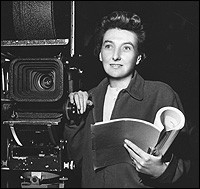
Violette, Baroness Gardiner, known professionally as Muriel Box, was an English screenwriter and director, Britain's most prolific female director, having directed 12 feature films and one featurette. Her screenplay for The Seventh Veil won an Academy Award for Best Original Screenplay.
Frank Sydney Box was a British film producer and screenwriter, and brother of British film producer Betty Box. In 1940, he founded the documentary film company Verity Films with Jay Lewis.

Kenneth Cooper Annakin, OBE was an English film director.
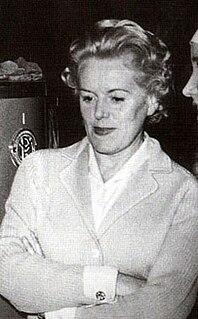
Betty Evelyn Box, was a prolific British film producer, usually credited as Betty E. Box.

British Lion Films is a film production and distribution company active under several forms since 1919. Originally known as British Lion Film Corporation Ltd, it went into receivership on 1 June 1954. From 29 January 1955 to 1976 the company was known as British Lion Films Ltd, and was a pure distribution company with a filmography of 232 films. It is still active as a production company, and has produced over 170 films.

Patricia Roc was an English film actress, popular in the Gainsborough melodramas such as Madonna of the Seven Moons (1945) and The Wicked Lady (1945), though she only made one film in Hollywood, Canyon Passage (1946). She also appeared in Millions Like Us (1943), Jassy (1945), The Brothers (1947) and When the Bough Breaks (1947).

Jassy is a 1947 British colour film historical melodrama set in the early 19th century, based on a novel by Norah Lofts. It is a Gainsborough melodrama, the only one to be made in Technicolor. It was the last "official" Gainsborough melodrama.
The Gainsborough melodramas were a sequence of films produced by the British film studio Gainsborough Pictures between 1943 and 1947 which conformed to a melodramatic style. The melodramas were not a film series but an unrelated sequence of films which had similar themes that were usually developed by the same film crew and frequently recurring actors who played similar characters in each. They were mostly based on popular books by female novelists and they encompassed costume, such as The Man in Grey (1943) and The Wicked Lady (1945) and modern-dress, such as Love Story (1944) and They Were Sisters (1945) settings. The popularity of the films with audiences peaked mid-1940s when most of the cinema audiences consisted of mainly women. The influence of the films led to other British producers releasing similarly themed works, such as The Seventh Veil (1945), Pink String and Sealing Wax (1945), Hungry Hill (1947), The White Unicorn (1947), Idol of Paris (1948), and The Reluctant Widow (1950) and often with the talent that made Gainsborough melodramas successful.
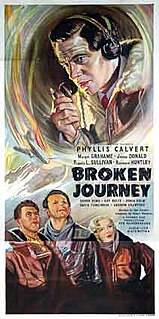
Broken Journey is a 1948 British drama film directed by Ken Annakin and featuring Phyllis Calvert, James Donald, Margot Grahame, Raymond Huntley and Guy Rolfe. Broken Journey deals with people struggling to survive after their airliner crashes on top of a mountain, and is based on a true-life accident in the Swiss Alps.

The Bad Lord Byron is a 1949 British historical drama film centered on the life of Lord Byron. It was directed by David MacDonald and starred Dennis Price as Byron with Mai Zetterling, Linden Travers and Joan Greenwood.

The Astonished Heart is a 1950 British drama film directed by Terence Fisher and Antony Darnborough. Starring Celia Johnson, Noël Coward, and Margaret Leighton, the film is based on Coward's play The Astonished Heart from his cycle of ten plays, Tonight at 8.30.

The Calendar is a black and white 1948 British drama film directed by Arthur Crabtree and starring Greta Gynt, John McCallum, Raymond Lovell and Leslie Dwyer. It is based on the 1929 play The Calendar and subsequent novel by Edgar Wallace that had previously been adapted in 1931.

My Brother's Keeper is a 1948 British crime film in the form of a convicts-on-the-run chase thriller, directed by Alfred Roome for Gainsborough Pictures. It was the first of only two films directed by Roome during a long career as a film editor. The film stars Jack Warner and George Cole and was produced by Sydney Box.
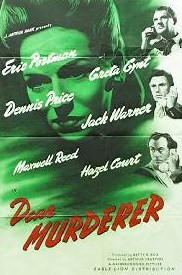
Dear Murderer is a 1947 British film noir crime, drama, thriller, directed by Arthur Crabtree for Gainsborough Pictures, and starring Eric Portman and Greta Gynt.
Verity Films was a British documentary film production company, founded by Sydney Box and Jay Gardner Lewis in March or May 1940.
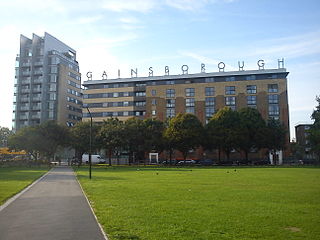
Islington Studios, often known as Gainsborough Studios, were a British film studio located on the south bank of the Regent's Canal, in Poole Street, Hoxton in the former Metropolitan Borough of Shoreditch, London between 1919 and 1949. The studios are closely associated with Gainsborough Pictures which was based there for most of the studio's history. During its existence Islington worked closely with its sister Lime Grove Studios in Shepherd's Bush and many films were made partly at one studio and partly at the other. Amongst the films made at the studios were Alfred Hitchcock thrillers, Will Hay comedies and Gainsborough Melodramas.

A Boy, a Girl and a Bike is a 1949 British romantic comedy film directed by Ralph Smart and starring John McCallum, Honor Blackman and Patrick Holt. The film's art direction was by George Provis. The film concerns the romantic escapades and adventures of a Yorkshire cycling club.

The Killer and the Slain is a 1942 novel by the British writer Hugh Walpole, published posthumously following his death the previous year. It recounts in first person narrative the story of a murderer who gradually turns into the man he has killed both morally and physically.